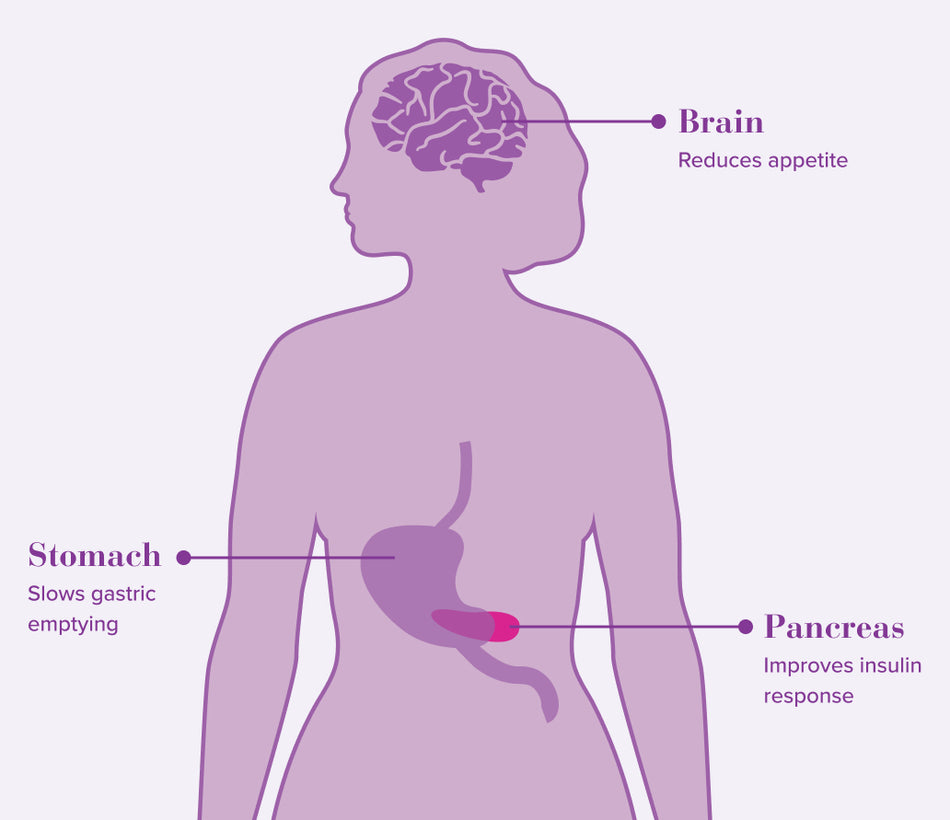Nutritional Support Made Simple for GLP-1 Wellness
Everything you need to know about staying nourished, energized, and supported while on GLP-1 therapies.
Shop GLP-1 SUpport
What Are GLP-1 Therapies?
GLP-1 medications are transforming the way we approach weight loss, but with their powerful effects on appetite, digestion, and metabolism, they can also change what your body may need nutritionally.
This guide helps break down how GLP-1 medications can impact your nutrition, which vitamins and nutrients may be most affected, and how to help maintain adequate intake, even if you’re eating less or experiencing occasional gastrointestinal GLP-1 side effects.
How Do GLP-1s Work?
GLP-1 receptor agonists are medications that mimic the effects of a natural hormone called glucagon-like peptide-1 (GLP-1). This hormone plays a key role in regulating appetite, digestion, and blood sugar levels.
When used under medical supervision, these medications can amplify the body’s natural GLP-1 activity, making them powerful tools commonly prescribed to help manage type 2 diabetes and support weight loss.

What Can Happen in Your Body While Taking GLP-1s
- Slows Digestion: GLP-1s delay gastric emptying, which means food stays in your stomach longer. This helps you feel fuller longer and eat less.
- Reduces Appetite: These medications act on the brain’s hunger signals, reducing the urge to eat and making it easier to stick to a lower-calorie routine.
- Improves Blood Sugar Control: By increasing insulin secretion (and reducing glucagon), GLP-1s help regulate blood glucose levels.
- Supports Weight Loss: By combining the above effects, GLP-1s create a powerful shift in how your body manages food, hunger, and metabolism.

How GLP-1s Can Affect Appetite, Digestion, and Nutrition
A primary mechanism of GLP-1 receptor agonists is appetite suppression. While that’s part of how they work, it also means your body may not get the nutrients it needs to feel energized and stay strong, especially over time.
Reduced Appetite & Meal Size
GLP-1s help you feel full faster and stay full longer. But with smaller meals and fewer snacks, it’s easy to fall short on essentials like protein, iron, and B12, even if you’re eating healthy.
Digestive Side Effects
Nausea, diarrhea, and vomiting are the most commonly reported occasional side effects. These issues can make food less appealing and, in some cases, impair nutrient absorption.
Long-Term Nutrient Depletion
When your appetite stays low for months or years, vitamin and mineral deficiencies can sneak up on you, especially in those who’ve had bariatric surgery or already struggle with digestive conditions.
Essential Nutrients to Watch When Eating Less on GLP-1s
When you’re eating less and digesting more slowly, it’s easy to fall short on important nutrients over time. This chart highlights just some of the key vitamins and nutrients that may require special attention during GLP-1 use, what they do for your body, and why it’s worth paying attention to them.
| Nutrient | Supports | Risk Cause |
|---|---|---|
| Vitamin B12 | Energy, focus, nervous system | Smaller meals & slower digestion may reduce absorption |
| Iron + Folate | Blood health, energy | Appetite suppression can lead to low intake, esp. for menstruating people |
| Vitamin D + Calcium | Bone health, immunity | Fat-soluble vitamins may be harder to absorb with reduced fat intake |
| Protein | Muscle maintenance, strength | Portion size makes protein intake harder to meet consistently |
Supplements That Complement Your GLP-1 Journey
When your appetite is low and your stomach’s more sensitive than usual, sticking to a supplement routine can feel like a challenge. That’s why Barimelts offers more gentle, bioavailable options made with the nutrients your body truly needs, with none of the harsh extras it doesn’t. Whether you’re focused on digestion, energy, or hair health, these formulas are here to support you:











